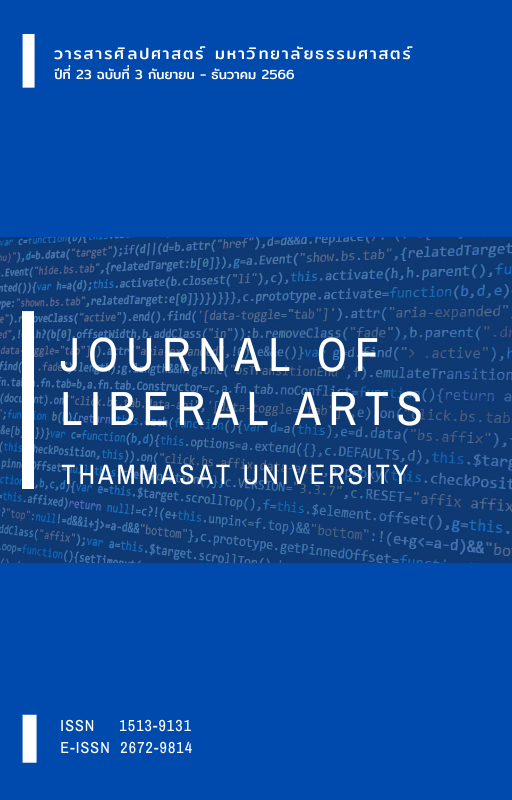การต่อสู้และจิตสำนึกทางการเมืองของชาวนาและผู้ตกอยู่ในสถานะรองในฟิลิปปินส์สมัยอาณานิคมใน PO-ON ของฟรานซิสโค ซีโอนีล โฮเซ
Main Article Content
บทคัดย่อ
บทความชิ้นนี้ต้องการศึกษาวิเคราะห์นวนิยายฟิลิปปินส์แบบหลังอาณานิคมในภาษาอังกฤษเรื่อง PO-ON ของฟรานซิสโค ซีโอนีล โฮเซ ผ่านกรอบคิด “การศึกษาผู้ตกอยู่ในสถานะรอง” เพื่อเผยให้เห็นว่า ภายใต้การปกครองของคณะสงฆ์คาทอลิกและข้าราชการอาณานิคมในช่วงปลายสมัยอาณานิคมสเปนและในสงครามฟิลิปปินส์-อเมริกันนั้น ชาวนาและผู้ตกอยู่ในสถานะรองชาวพื้นเมืองมีการต่อสู้ต่อการครอบงำดังกล่าวในรูปแบบที่หลากหลาย อีกทั้งยังเป็นการเคลื่อนไหวในระดับจิตสำนึกทางการเมืองที่ประกอบขึ้นจากโลกทัศน์และประสบการณ์เฉพาะของพวกเขาเอง ดังนั้น บทความชิ้นนี้จึงต้องการถกเถียงต่อวาทกรรมแบบจักรวรรดิในประวัติศาสตร์นิพนธ์ฟิลิปปินส์ยุคหลังอาณานิคมที่จัดวางให้กบฏชาวนาอยู่ในฐานะการต่อสู้แบบก่อนการเมือง และปราศจากจิตสำนึกทางการเมือง
Downloads
Article Details

อนุญาตภายใต้เงื่อนไข Creative Commons Attribution-NonCommercial-NoDerivatives 4.0 International License.
เอกสารอ้างอิง
ทวีศักดิ์ เผือกสม. (2560). เรย์นัลโด อิเลโต้: มวลชนคนชั้นล่าง ประวัติศาสตร์แห่งชาติ และความรู้แบบอาณานิคม. สมมติ.
รณชิต คูหา. (2564). กบฏชาวนา: มูลฐานจิตสำนึกในอินเดียยุคอาณานิคม (ปรีดี หงษ์สต้น, ผู้แปล). Illuminations Editions. (ต้นฉบับพิมพ์ปี 1983).
สิงห์ สุวรรณกิจ. (2558). งานศึกษาผู้ตกอยู่ในสถานะรอง’: ทบทวนประวัติศาสตร์นิพนธ์และมวลชนผู้เคลื่อนไหว. วารสารสังคมศาสตร์ มหาวิทยาลัยเชียงใหม่, 27(1), 149-189.
สิริฉัตร รักการ. (2561). ประวัติศาสตร์นิพนธ์ฟิลิปปินส์กับชะตากรรมของชาติ: อาการตาสว่างกับอารมณ์ค้างแบบหลังอาณานิคม. Illuminations Editions.
Agoncillo, T. A. (1956). The revolt of the masses: The story of bonifacio and the Katipunan. University of the Philippines Press.
Agoncillo, T. A. (1963). Writings and trial of Andres Bonifacio. Bonifacio Centenial Commission and the University of the Philippines.
Agoncillo. T. A. (1972). Gap in Philippine History. In Proceedings and Working Papers of the First Seminar for Provincial Historical Committees (pp. 1-112). National Historical Commission.
Agoncillo, T. A., & Magahas, F. B. (2010). Philippine History. C & E Pu Publishing.
Aguilar, F. (2020). What made the masses revolutionary?: Ignorance, character, and class in Teodoro Agoncillo’s the revolt of the masses. Philippine Studies: Historical and Ethnographic Viewpoints, 68(2), 137-78.
Anderson, B. (1991). Imagine communities: Reflections on the origin and spread of nationalism. Verso.
Antonio, J. L., & Ancheta, C. F. (2014). The Basi revolt of 1807: Its historical and axiological relevance. In the DLSU Research Congress 2014: Towards Rigorous, Relevant and Socially Responsive Lasallian Research (pp. 1-8). De la Salle University.
Benitez, C. (1926). History of the Philippines: Economic social political. Ginn and Company.
Cano, G. (2005). The ‘Spanish Colonial Past’ in the construction of modern Philippine history: A critical inquiry into the (mis)use of Spanish source [Doctoral dissertation, National University of Singapore]. Core.
Cano, G. (2013). LeRoy’s the Americans in the Philippines and the history of Spanish rule in Philippines. Philippine Studies, 61(2), 3-44.
Chakrabarty, D. (2000). Provincializing Europe: Postcolonial thought and historical difference. Princeton University Press.
Chatterjee, P. (1993). Nationalist thought and the colonial world: A derivative discourse. University of Minnesota Publishing.
Constantino, R. (1972). A backgrounder in Philippine history. In Proceedings and Working Papers of the First Seminar for Provincial Historical Committees (pp. 1-112). National Historical Commission.
Constantino, R. (1975). The Philippines: The continuing past. Foundation for Nationalist Studies.
De la Costa, H. (1961). The Jesuits in the Philippines, 1581-1768. Harvard University.
Foucault, M. (1994). The order of things: An archaeology of the human sciences. Vintage.
Ileto, R. (1979). Pasyon and revolution: Popular movements in the Philippines, 1840-1910. Ateneo de Manila University Press.
Ileto, R. (1988). Towards a non-linear emplotment of Philippine history. In L. T. Ghee (Ed.), Reflections on Development in Southeast Asia. Institute of Southeast Asian Studies.
Ileto, R. (1999). Religion and anti-colonial movement. In N. Tarling (Ed.), The Cambridge History of Southeast Asia Volume Three from c. 1800-1930s (pp. 193-244). Cambridge University Press.
Ileto, R. (2001). Orientalism and the study of Philippine politic. Philippine Political Science Journal, 22(45), 1-32.
Ileto, R. (2011). Reflection on Agoncillo’s “Revolt of the Masses” and the politics of history. Southeast Asian Studies, 49(3), 496-520.
Jose, F. S. (2005). Literature as history. Lecture in The Writer in Residence Program, May 5, The Cubberley Auditorium of Stanford University in Palo Alto, California.
Jose, F. S. (2010). Po-on. Solidaridad Pubhishing House.
Karnow, S. (1989). In our image: America’s empire in the Philippines. Foreign Policy Association.
Lande, C. (1965). Leaders, factions and parties: The structure of the Philippines politic. Yale University.
LeRoy, J. (1905). A Philippine life in town and country. G.P. Putnam’s Sons.
May, G. A. (1984). Private Presher and Sergeant Vergara: The underside of the Philippine-American war. In P. Stanley (Ed.), Re-appraising an Empire: New Perspective on Philippine-American History (pp. 35-57). Harvard University Press.
Palanco, F. (2002). Diego Silang’s revolt: A new approach. Philippine Studies, 50(4), 512-537.
Palanco, F. (2010). Revolt of 1975: According to Spanish primary source. Philippine Studies, 58(1/2), 45-77.
Paredes, O. (2013). A mountain of Difference: The Lumad in Early Colonial Mindanao. Cornell University.
Rafael, V. (1988). Contracting colonialism: Translation and Christian convertion in Tagalog society under early Spanish Rule. Cornell University.
Rafael, V. (2000). White love and other events in Filipino history. Duke University Press.
Roth. D. (1977). The friar estates of the Philippines. University of New Mexico Press.
Salazar, Z. (1993, November 20). Ang Relihiyong Austronesyano ng Anito: Batayan ng Sinaunang Sampalataya ng Kapilipinuhan. In the Symposium: Spirit of the Philippines [Symposium]. Manila, Philippines.
Salazar, Z. (1996). Ang Babaylan sa Kasaysayan ng Pilipinas, In Woman’s Role in Philippine History: Selected Essay (pp. 52-72). Center for Woman’s Studies, University of the Philippines.
Scott, W. (1974). The discovery of the Igorots: Spanish contacts with the Pagans of Northern Luzon. New Day.
The President of the Philippines. (1973). President decree No. 105: Declaring national shrines as sacred (Hallowed) place and prohibiting desecration thereof. The Official Gazette. https://www.officialgazette.gov.ph/1973/01/24/presidential-decree-no-105-s-1973/
The President of the Philippines. (1969). Republic act No. 5464: An act declaring the period from January one to December thirty-on, nineteen hundred sixty-nine, as the general Aguinaldo centennial year, and appropriating funds therefor. The Official Gazette. https://lawphil.net/statutes/repacts/ra1969/ra_5464_1969.html


